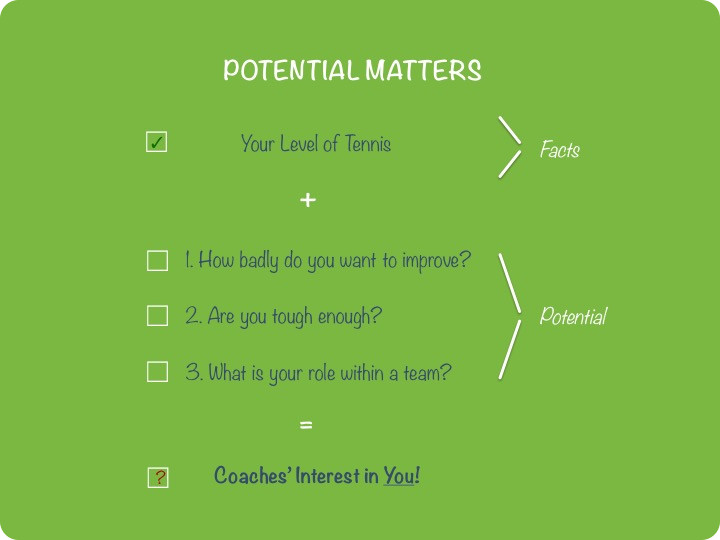3 Reasons Why Potential Matters To College Tennis Coaches

Your level of play: that's your national and international rankings, your Universal Tennis Rating, and your tournament results - again, on a national and international level. Not to forget the coaches seeing you perform at a showcase, tournaments or during your visit at college. Or if none of that's viable, at least a well-edited recruiting video, highlighting your strength - and weaknesses for that matter :). It's the level of play that you are able to bring to the court right now.
But what about your future level of play? Once you really arrive at college? Or 2 years down the road? With that said, the whole recruiting process in a sense also boils down to another important question:
As a future four-year student athlete, to what degree will you be able to improve your skills? What will be your contribution to the team?
Obviously all your talent and hard work leading up to that point matter a great deal and determine largely how far you'll be able to take your game. But going forward, it is about your attitude and your ability to work hard. Therefore, the coaches will try to get to know you as well as possible, in order to answer the following three questions:
- How badly do you want to improve?
- Are you tough enough?
- What is your role within a team?

Let's go through the questions:
1. How badly do you want to improve?
Why do you want to be a student athlete?
Because...
- You want to develop as an athlete and improve your game.
- You are tired of playing tennis, but you like the idea of getting financial aid for your college bill.
- Your dream of being a professional athlete failed.
If the latter two are the case, you will run into problems with your future coach. Four years is a long time in which the coaching staff tries to get the best out of you. Every tennis program has already had that one talented kid, who does not want to work hard. Such a player is difficult to handle, because the coach's job is to improve the overall performance of the team. If the athlete is simply not willing to put an effort into getting better this is quite an uphill battle for the coach. On top of that such an attitude has a negative impact on the whole team.
That's why coaches will do their best to recruit athletes who are excited to develop, rather than the ones who are simply "done with tennis". It almost always creates trouble within the team and leads to a bad team performance.
2. Are you tough enough?
Another aspect coaches look at closely, is how mature you are as a person. Being a student athlete at college is mostly very tough, due to the enormous time commitment. During the week athletes generally have roughly 15 hours of classes and 20 hours of practice scheduled. In addition, there is always some homework to be done and during season you will be competing and traveling most of the weekends.
Such a schedule requires a lot of discipline and dedication, especially in difficult times. Since coaches are looking for 4-year commitments, they need to evaluate your resilience: How do you perform under pressure and stress?
That's why most of the coaches highly value students with a strong academic background. Good students are generally hard workers and are capable of powering through tough times, while saving energy to still keep up their game and keep developing.
3. What is your role within a team?
College tennis is a team sport. For many tennis players this is often a completely new experience: learning that the individual performance is far less important than the team's performance. Unfortunately, it only takes one team member to destroy the team spirit, which is one of the most important aspects during a dual team match.
Coaches therefore try to identify what kind of personality you bring to the table. Are you a leader or a follower? Are you the person that unites different characters or the one that disturbs the team spirit? Coaches look for hard working team players, leaders, people that get along with everyone on the team: People with the potential to greatly impact the other players on the team.
All the 3 points above are meant to show you that being a good athlete alone is not everything. It will open the door to plenty of opportunities and coaches to talk to, but talent alone will not be enough to receive a proper offer. 4 years is a long time and because of that, coaches have even stronger reasons to thoroughly assess their prospects' potential.
Try to answer the 3 questions for yourself:
- Why do you want to play college tennis? Is it your parents pushing you to get financial aid to pay for tuition or is it you dying to compete for the school of your choice and have fun on the court?
- Are you willing to work hard? Not just the first month upon arrival, but on a steady basis? Combining school work and conditioning in the gym? Travelling on the weekends and making up "lost time" in the evenings?
- And how do you do in a team environment? Are you OK with not having your very personal (junior) coach just for yourself 24/7? Are you OK with losing because the team did superbly altogether?
Getting recruited is a fun period of time, leading up to eventually starting at college in the fall or spring semester! Prepare yourself and be aware of what it is coaches will be looking out for - you will have even more fun...
If you have a realistic view of your strength right now and the potential you may have in the future, it will be tons easier to show what you've got when speaking to the coaches.
Create a free recruiting profile on Smarthlete right now or follow us on our Facebook and Twitter accounts for more college tennis information and useful tips!